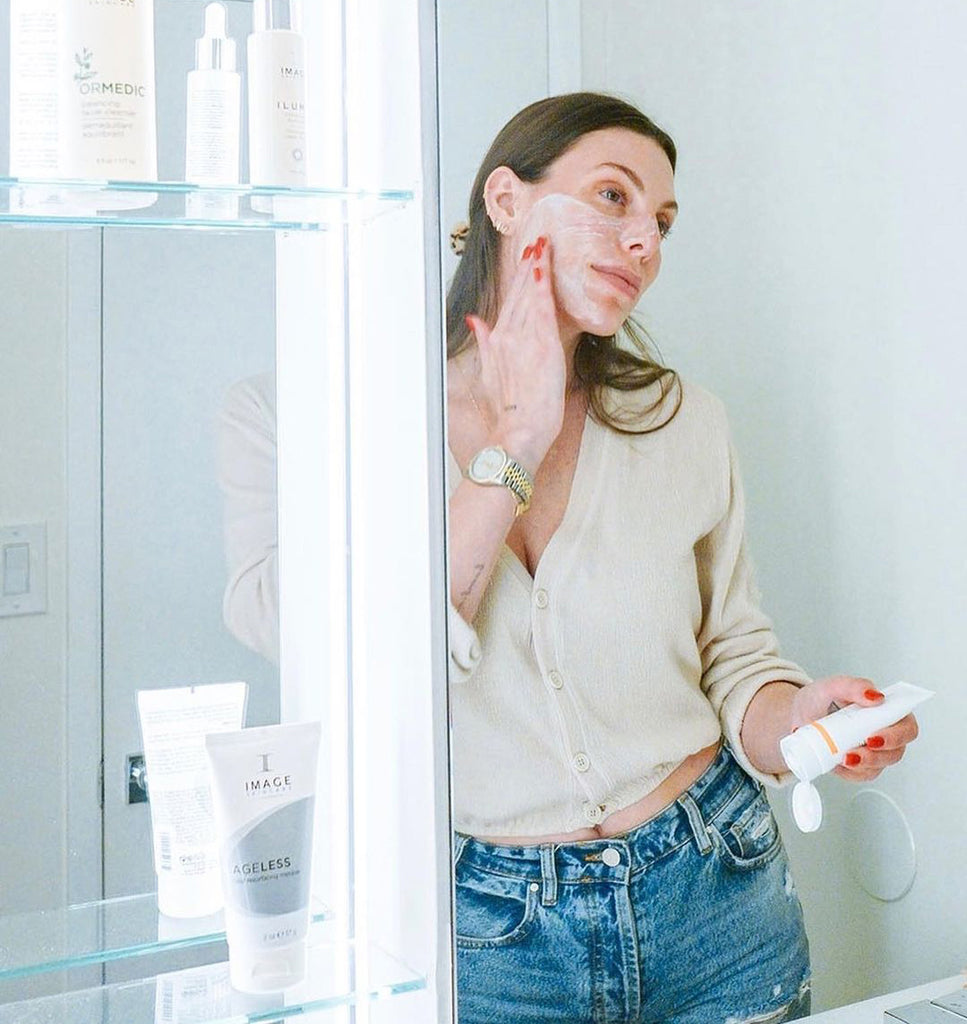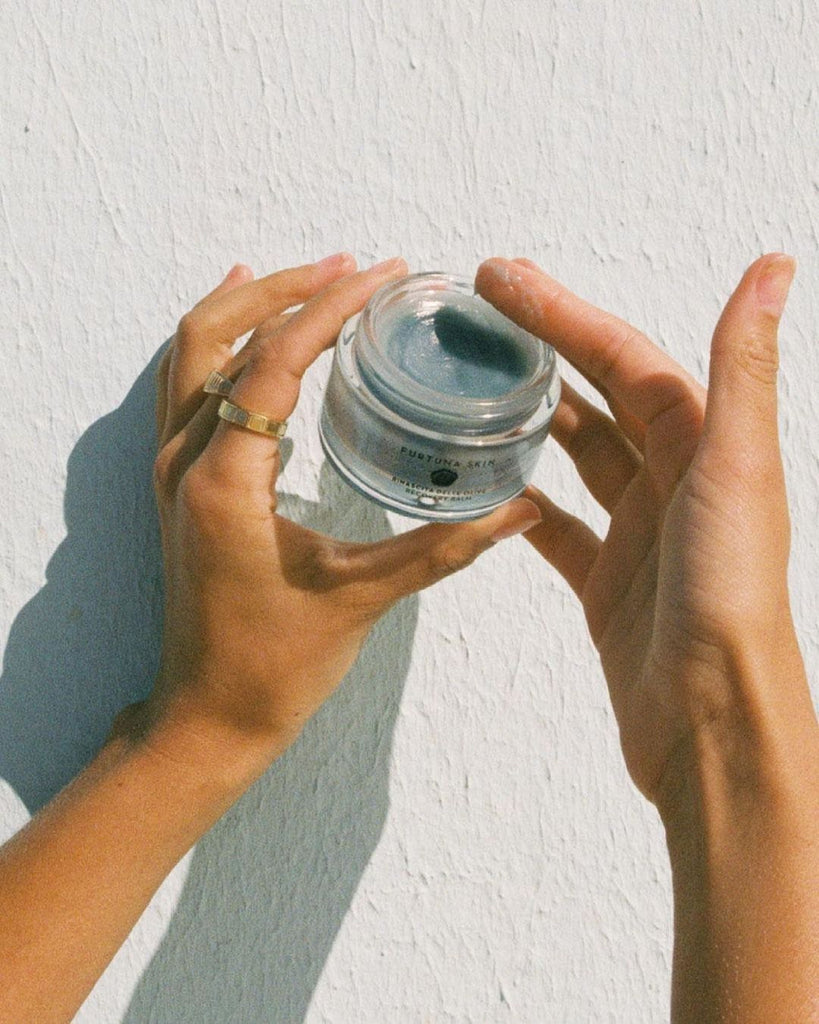One of the most impressive things about modern shopping is how easy it is to get something custom-made. Want your pots and pans engraved with your favorite song lyric? No problem. How about a monogrammed handbag? Easy-peasy. Bespoke beauty products go even further. Brands like Bite Beauty and Orly enable customers to design their own lipstick and nail polish shades; on the more extreme end, there’s Barbara Sturm’s $1,400 “blood cream” made from a patient’s own blood.
More recently, another type of bespoke skin care has been popping up — one that uses AI technology such as facial recognition and computer algorithms. This type of customization may be particularly intriguing to people who have exhausted all other options for their skin, and especially now, as the ongoing pandemic has uprooted our regular facials and dermatologist appointments.
The first name that comes to mind when thinking of custom acne treatments might be Curology, the popular skin-care brand that pairs customers with dermatology providers after they take a quiz and send photos. But software-based skin-care brands like Atolla, Proven, and Yours forgo the real-person factor and depend entirely on artificial intelligence. The people who started these companies are also from unexpected backgrounds: They aren’t beauty-industry veterans or celebrities, but engineers and tech-industry execs, prompting some to wonder if the future of acne skin care is going to be determined by yet another algorithm.
Though each brand is different, the basic gist is this: You answer a series of questions pertaining to your age, skin type, and skin concerns, as well as those related to diet and lifestyle. Some of the questions may be straightforward, while others go more in-depth. Proven, which offers a variety of products, will ask what your acne looks like, how your skin feels post-shower, if you eat processed foods, and your zip code. All of these factors are taken into consideration by the AI when it creates your formula. Los Angeles, for instance, brings up the threat of “very high UV rays,” as well as hard water, which can irritate the skin. The MIT-founded Atolla, which currently only offers a serum but is expected to have a cleanser and moisturizer in 2021, asks some particularly personal questions — like the customer’s ethnicity and when their last period started — in addition to whether you prefer a water- or oil-based serum.
Yours may not go as in-depth as asking about your menstrual cycle, but it does have a standout feature: computer vision technology. According to Navneet Kaur, a former Uber executive who co-founded the company with her husband and fellow Uber alum, Shivam Sharma, this is an important part of Yours’ process. “The user starts with a skin assessment where we learn more about their lifestyle and environment, and then they upload a selfie for which we run analysis using computer vision which helps us decode what their skin needs actually are,” explains Kaur. The photo allows the AI to analyze the type of acne, level of redness, depth of wrinkles, and so on.

PHOTO: COURTESY OF YOURS.
Yours has the most extensive range of products available to personalize, with serums and creams for day and night, along with a proprietary eye serum and peel pads.
The Singapore-based brand boasts cruelty-free, environmentally-friendly formulas that are made in Switzerland, where European cosmetic regulations restrict over 1,300 potentially harmful ingredients, compared to the United States where only 30 are currently banned. “We also have our internal list of over 1,400 ingredients that we don't use because they're either not good for you or for the environment,” says Kaur, adding that it ties back to the brand’s key mission of keeping skin care “simple and sustainable.”
The Good Face Project, which was founded by two engineers, Iva Teixeira and Lena Skliarova-Mordvinova, also helps customers find the right products by using AI-powered recommendations. Teixeira came up with the idea for the company when she was working as a consultant and interviewed 115 women who were frustrated with the over-saturation of the beauty industry. “They get their clothing through Stitch Fix, their entertainment suggestions through Netflix, and they curate their music through Spotify, so they just couldn't understand why something like that was not available in beauty,” she says.
One significant difference with the Good Face Project is that it doesn’t have its own in-house skin-care line; instead, it pulls from a database of 4,500 brands and makes recommendations at a variety of price points. The decision for the brand to not launch its own line was purposeful. “The consumer does not need another skin-care brand,” explains Teixeira. “There are over 3,000 brands that launch annually. It's just more noise to the consumer, and we really are taking the contrarian point of view that, under the sun, there's already enough product for all of us. We're just trying to find the right product for the right person.”
Even if there are consumers who appreciate the skin-care market’s wealth of options, there’s undoubtedly an allure to having your own custom treatment, which may make acne patients and skin-care fans more inclined to experiment. Nikki Lopez, a 21-year-old skin-care influencer in Virginia, was intrigued by Yours after seeing it on friends’ Instagrams. “I love the way that they market themselves and how personal they get with their customers,” says Lopez. She liked the products a lot at first, but eventually had to stop using the night cream after having a reaction. According to its FAQ, Yours offers one complimentary reformulation with each full set order, and asks customers to include photos of their skin as well as inform them of any issues so they can identify the ingredient that may be causing irritation. (Kaur also says that most of the users who have a reaction are not aware of their skin triggers, and the most common one is a vitamin C allergy.)

PHOTO: COURTESY OF PROVEN.
Proven's streamlined selection includes cleanser, night cream, and moisturizer with SPF.
Alexandria Taliaferro, a 25-year-old social media manager and skin-care enthusiast in New York, noticed an improvement in her skin after using Atolla to treat uneven texture and milia left over from breakouts. After inputting her data online, Atolla’s algorithm produced a custom serum made up of 2% salicylic acid, .15% turmeric extract, and vitamin B5. “As someone who has lots of experience in the skin-care industry, that particular type of product knowledge is a little more readily available to me, but Atolla does a great job of giving you lists of potential irritants and possible incompatibilities with other products you’re currently using, which levels the playing field a bit,” she says.
Kat Theis, a 35-year-old photographer from Texas, says she’s been using Proven to treat the adult acne and rosacea she’s dealt with since having her daughter at age 22. “The tone has evened out, I feel like my skin has an inner radiance to it…and best of all, my acne has almost completely cleared up, minus the occasional zit here or there due to hormones or stress,” says Theis, adding that she was able to stop using prescription drugs for acne. She also says that each quarter, she gets sent a new formulation based on the seasons, pollution, and weather where she lives.
Dermatologists and estheticians, as you can imagine, have some strong feelings when it comes to these AI-powered skin solutions.
“When it comes to health and skin, there are more questions that need to be answered outside of what can be obtained from checking a box,” says L.A.-based facialist Candace Marino. “A proper skin-care consultation should be a two-way conversation between a client and a provider, not a list of generic questions.”
Marino took quizzes from Proven, Yours, and the Good Face Project and felt that Proven had the most in-depth consultation process of the three. However, she points out that none of the services addressed melasma, which is her main concern. “I felt that none of these services were thorough enough to help me with my skin because melasma is impacted by heat, hormones, and sun exposure,” she says. “If I weren't a skin-care professional I may have left the questionnaire just believing I had sun damage.”
"When it comes to health and skin, there are more questions that need to be answered outside of what can be obtained from checking a box."
Marino says that even through virtual consults with her clients, she’s been able to break down the “why” someone is experiencing a certain skin condition and can usually figure out how to resolve it after doing a little digging. “For this reason I firmly believe a two-way conversation will always be the best and most thorough way to address someone's skin concerns, and even if the industry does make a major shift for these services, there will always be old-school skin-care professionals like myself who will maintain the personalized touch of a real, in-depth consultation for their clients,” she says.
Marisa Garshick, M.D., a dermatologist at MDCS: Medical Dermatology and Cosmetic Surgery in New York, feels the same way. “When it comes to acne skin care in general, there is no doubt that an individualized approach is important, as the products or ingredients that work well for one person may not be the same for another can differ based on the type of breakouts and skin type, among other factors,” she says. While Dr. Garshick acknowledges that figuring out the right products to use can be overwhelming and these types of programs might narrow things down, she says it shouldn't replace speaking with a board-certified dermatologist to determine the best skin-care regimen.
“The concept of simplifying skin care, as some of these programs do, can be helpful, as I often find patients trying many different products all at once which can lead to irritation or having too many products and not remembering when to use what,” says Dr. Garshick. “I like that these programs create a simplified and consistent approach to skin care and make it easy for consumers to understand.”
While algorithm-based acne treatments may not be the same as seeing a dermatologist for individualized attention, they may still be interesting to try — especially right now, when some states are still restricting services like facials and many people simply do not feel comfortable enough to make an in-person visit to their esthetician. In fact, Atolla, Yours, and the Good Face Project have all reported an increase in sales during COVID-19. Ultimately, skin care is always subjective, and finding the right acne treatment can be an agonizing journey. So, why not see if artificial intelligence can help us achieve clear skin? After all, it's set to take over the world one day.



